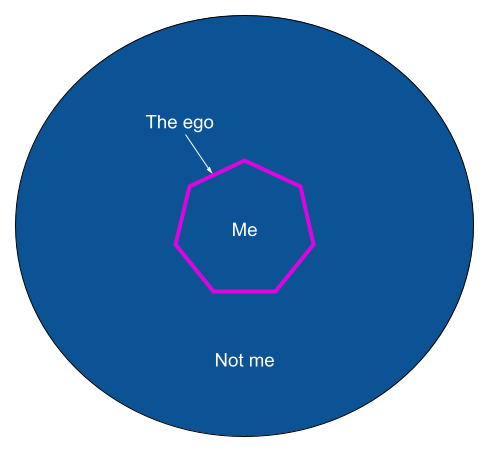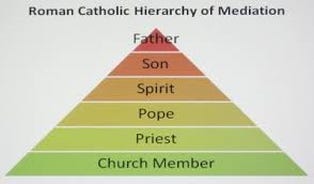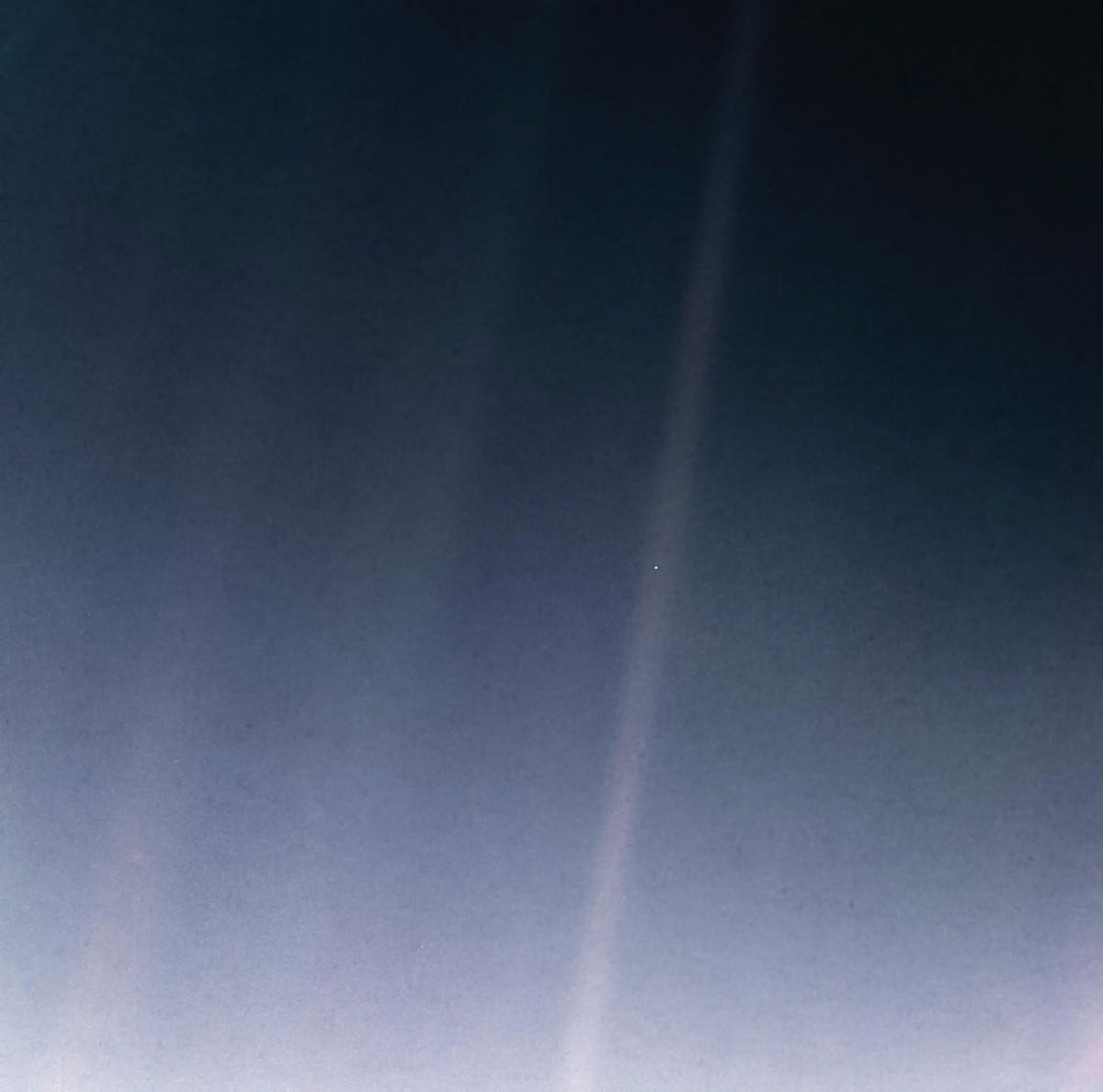Religion is an Ego-modulator
William James, Aldous Huxley, and the functions of religion
View on SubstackIt’s hard to define precisely what constitutes a religion. But by looking at religion through different lenses, we can start to get a clearer sense of the functions it serves. And as we transition into an increasingly secular society, it’s important to understand what we might be losing in the process.
Expanding on arguments made by William James and Aldous Huxley, I’d like to argue that a major function of religion is modulating the relationship between self and other, i.e. our egos.
Outline
The Ego
Commonalities of Religious Experience
Metaphysics and the Ego
Case Studies
Catholicism
Buddhism
Science
The Ego
Before we proceed, we’ll have to define the word ego. It’s frequently used in a pejorative way, to describe anyone who acts selfishly or narcissistically. But developing an ego is a critical part of childhood development; without it we wouldn’t be able to understand or regulate our behavior.
(Note: the ideas below are synthesized from a number of different sources. Treat this as a working definition rather than objective fact.)
For the sake of this discussion, we’ll define ego as your sense of self, as the dividing line between what’s “you” and what’s “not-you”.
You can think of your ego as the story you tell yourself about yourself. It likely includes your gender, race, age, and occupation, but also more fundamental aspects of your identity, like your status (do you think of yourself as successful? or as a loser?), relationship to your peers (do you feel tend superior or inferior? included or excluded?), and your relationship to society at large (do you fit in, or rebel?).
The shape, size, and permeability of this boundary are the primary parameters of personality. Our egos determine how we treat others, how we react to conflict or misfortune, and how we wield power.
(Note that the blue circle doesn’t represent the physical universe—a narcissist doesn’t think the couch he’s sitting on is part of himself. It represents something like concept-space.)
Commonalities of Religious Experience
It’s important to recognize that a person’s ego is not fixed. Any meaningful and lasting change in our behavior corresponds to a change our ego. Or as William James put it, “If you can change your mind, you can change your life.” He believed that one of the markers of religious experience is metanoia, a fundamental and stable change in an individual’s life-orientation.
James was a Harvard philosopher and psychologist with particular interest in the psychology of religion. In 1901 he delivered a series of lectures, now published as The Varieties of Religious Experience, which set the foundation for a scientific study of religious attitudes.
Despite the title, the most profound passages in the book discuss not the varieties, but the commonalities of religious experience:
When we survey the whole field of religion, we find a great variety in the thoughts that have prevailed there; but the feelings on the one hand and the conduct on the other are almost always the same, for Stoic, Christian, and Buddhist saints are practically indistinguishable
As a self-described "radical empiricist," he spends much of the lectures enumerating the external, visible effects of religious experience. James points out that the saints of all religions are inclined towards living a simple life and treating others selflessly. He describes the “saintly character” as having:
1. A feeling of being in a wider life than that of this world's selfish little interests…
2. A sense of the friendly continuity of the ideal power with our own life, and a willing self-surrender to its control.
3. An immense elation and freedom, as the outlines of the confining selfhood melt down.
4. A shifting of the emotional centre towards loving and harmonious affections, towards “yes, yes” and away from “no,” where the claims of the non-ego are concerned.
In other words, the hallmark of a religious mind is a smaller ego.
Half a century later, Aldous Huxley expanded on James’ theory by drawing from a wide variety of religious texts. In his book The Perennial Philosophy, Huxley attempts to further distill the common element of religion.
Again, Huxley’s thesis is that religion serves to lessen our ego, though he our sense of self as separate from other people and the wider world. Citing Meister Eckhart, Huxley says:
It is only when we have renounced our preoccupation with “I,” “me,” “mine,” that we can truly possess the world in which we live.
Huxley contends that all religions are systems for reducing our individual egos and identifying more strongly with the group (or in the case of the most extreme mystics, with the universe itself).
But both these approaches ignore the wide range of cases where religion creates outsized egos. I believe there’s a more generic description of religion than James or Huxley account for.
Seeing religion as an ego-modulator, instead of simply as an ego-reducer, helps to explain a wide variety of religious phenomena. Cult leaders, abusive priests, and starry-eyed New Agers have all found their way into the ego-maximizing side of religion.
Metaphysics and the Ego
But first: how does religion regulate the shape of our egos?
One of the primary attributes of any religion is its creed. Each world religion professes a unique set of metaphysical beliefs, which is central to its identity. Anyone who contradicts or denies these beliefs is condemned or cast out as a heretic.
It’s tempting to think of metaphysical belief as something esoteric and removed from daily life. But metaphysical beliefs provide a foundation for our picture of reality—they are the roots from which a worldview grows.
If you believe in a paternalistic king god, you will likely value hierarchy and power. If you believe in a pantheistic god who is present in every animal, tree, hill, and rock, you will have a deep empathy for nature. If you’re a scientifically-minded atheist, you probably see reality as something to be studied and harnessed. None of these associations is set in stone—there are certainly some anarchic Christians and plenty of environmentalist atheists. But in general, people take their metaphysical beliefs seriously, and use them to guide their behavior.
Most religions have a Higher Power or Transcendental Self at the root of their ontology. This is why Huxley and James identified a common pattern of ego-reduction across religions—the more deeply you become aware of an immense Other, the smaller you feel yourself to be.
But it’s easy to see how the same metaphysics can be perverted to have an equal but opposite effect. The concept of a Higher Power immediately creates a sense of hierarchy, and anyone who believes themselves to be “closer” to that Power than others will feel their ego begin to inflate.
Case Studies
Catholicism
In the case of Catholicism, it’s easy to see how the concept of God as King reinforces loyalty and obedience to the Church, which is organized in a hierarchy, with the Pope as God’s ultimate representative on Earth.
But the Catholic Church is also a perfect case study for ego-modulation gone wrong. From 1950 to 2002, about 4% of the people ordained as priests were accused of child sexual abuse. What went wrong?
In his book Facing the Dragon (which I reviewed here), Psychologist Robert Moore argued that elevating particular people to serve as divine representatives can cause their ego to inflate out of control. Moore says:
Think if you were the pope. It would be a real spiritual problem to deal with your grandiosity because everyone constantly dumps their idealizing projections onto you. It would be a tremendous problem. If you think the priest has a problem, the bishop has a greater problem, the archbishop an even worse one, and if you were trying to be the spiritual leader of all the millions of Roman Catholics in the world, think of carrying that archetypal burden. Think about going around the world and having 400,000 people gathered in front of you idealizing you while you do Mass. This man obviously has to be relatively healthy emotionally or he would become greatly disturbed.
So clergy have a huge emotional challenge. Just because you are ordained doesn’t mean that your shadow disappears. I deal with clergy all the time who have massive problems managing their own grandiosity. They tend to act out a lot. In fact, the phenomena of clergy acting out sexually, or in substance abuse, workaholism, or any other compulsive behavior, relate directly to the problem of managing their inner grandiosity.
It’s important to recognize that the ego-structure set up by Catholic metaphysics allowed the abuse to happen. It granted priests divine authority, despite their humanness, and both the priests and their parishioners take this quite literally. It’s noteworthy that the quote “absolute power corrupts absolutely” was explicitly about the Catholic Church.
Buddhism
Buddhism makes for a good second case study, as it has a very different type of metaphysics from Catholicism. Rather than having a King God at the top of a rigid hierarchy, Buddhism denies the existence of any individual self. In Buddhism, ego-reduction comes about through contemplation and gradual understanding of impermanence and non-self.
Where does it go wrong? We might think that with no deity to align yourself with, no individual could be elevated above their peers. But Buddhism elevates more “realized” practitioners above the crowd. Those who are perceived as having reached Nirvana naturally have higher status and authority.
Buddhists typically take serious precautions, in part to prevent abuse of this authority. But it has sometimes gone horribly wrong, especially when sects don’t take those precautions seriously. The most heartbreaking case is that of Ösel Tendzin, who slept with and forcibly raped his students, all while knowing he was HIV-positive. The Atlantic and Slate Star Codex have catalogued several other cases.
This is a common pattern among Enlightenment-oriented religions—those who are deemed “fully realized” gain an unworldly amount of power and prestige.
Science
This one is a bit of a stretch. Bear with me for a minute while I—inadvisably—equate science with religion.
Friedrich Hayek popularized the term Scientism to describe the dogmatic attitude displayed by the strongest advocates for modern science. Typically, the word Scientism is used pejoratively, but I would argue Scientism comes with a huge benefit: it has helped establish the importance of science in the public’s imagination. The average person can become enamored with science for unscientific reasons.
The High Priest of Scientism would have to be Carl Sagan, whose popular expositions of scientific knowledge—especially through the program Cosmos—inspired billions and billions (okay, only half a billion) people.
While it’s not entirely fair to call it a religion, the parallels between Scientism and traditional religion have been thoroughly discussed. Sagan even delivered a series of lectures in tribute to William James, called The Varieties of Scientific Experience.
Importantly, Scientism engenders the same ego-reducing effect as religion. This is most evident in Sagan’s description of the Pale Blue Dot photo (below):
Look again at that dot. That's here. That's home. That's us. On it everyone you love, everyone you know, everyone you ever heard of, every human being who ever was, lived out their lives. The aggregate of our joy and suffering, thousands of confident religions, ideologies, and economic doctrines, every hunter and forager, every hero and coward, every creator and destroyer of civilization, every king and peasant, every young couple in love, every mother and father, hopeful child, inventor and explorer, every teacher of morals, every corrupt politician, every "superstar," every "supreme leader," every saint and sinner in the history of our species lived there--on a mote of dust suspended in a sunbeam.
So if Scientism has the same ego-reducing function as traditional religions, what’s it’s complementary ego-maximizer?
I’m not entirely sure on the answer here. While Sagan’s would-be successor has some sex scandals of his own, I don’t think there’s a demonstrable pattern of high-profile scientists or science advocates getting away with destructive, narcissistic behavior (at least no more than in other professions).
Maybe Scientism is simply better at ego-maintenance than its religious analogs. One of science’s strongest dogmas is the transpersonal nature of scientific progress—no individual can claim unique authority. Even its most venerated prophets are understood to be fallible.
Of course, Scientism still has some of the common failure modes of religion. There is plenty of hatred for the outgroup (looking at you, r/skeptic). And its image of man as the “apex intelligence” of the universe has arguably led to some existential risk.
But all that aside, I’m beginning to think of Scientism less as a perversion of science, and more as an evolutionary leap in religious culture. I hope to explore that idea more deeply in a future article.
Related
Join the discussion on Substack!





